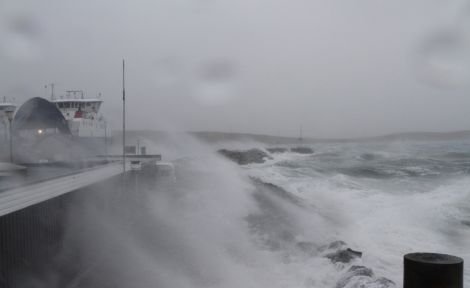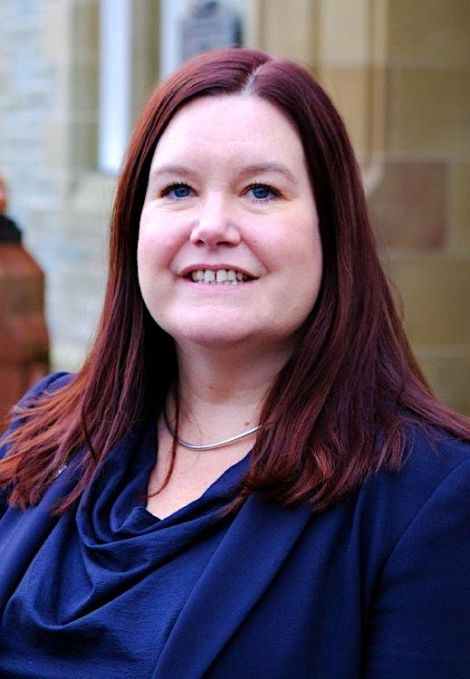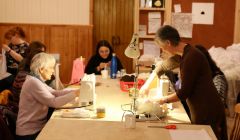Climate / What folk are doing to beat the big New Year climate change challenge
FORGET war, the economy and even Brexit, climate change and human pollution pose the greatest threats life on this planet has faced since the last ice age.
Global warming means the onset of storms, droughts and flooding. Melting ice and rising sea levels and temperatures won’t just penalise the polar bears – “cold water” fish like cod and haddock might swim out of the North Sea to be replaced by unfamiliar species, while the weather in Shetland seems set to get wetter and windier.
Plastic waste, meanwhile, has become the pollution issue of the century with the sea polluted almost everywhere on the planet and old landfills spewing plastic that has accumulated since the 1930s.
In this two-part feature Shetland News has asked local people (or those with a strong link to the local community) what they are doing in their personal and professional lives to try to counter these potentially catastrophic changes. Some are taking small steps, while others are bolder in their approach. But if everyone took them, they could make a difference for humankind.
Please feel free to add your comments at the bottom of this page and let us know what you are planning to do for the planet in 2019.
Part 2 can be read here.
ALASTAIR COOPER
North Mainland councillor Alastair Cooper decided to invest in new LED lighting at home, and this has set him considering whether to replace the byre lights and garage strip lights with more reliable and energy saving LEDs.
“We have 16 downlights at home and there was a heck of a heat coming off them into the loft space. Even when they were switched off you could feel the heat coming from the house as they have to be well ventilated.
“So replacing them with LEDs we are cutting the heat leaking into the loft and cutting electricity usage as they run at a fraction of the current. Halogen bulbs also do not last as long, but with the LEDs they are rated 25,000 hours.
Become a member of Shetland News
“We got 16 peerie bulbs from Rexel in Lerwick for £12.30 each which did not break the bank. Hopefully in terms of usage it will not be that long before we get the money back.”
ROSA STEPPANOVA
Noted gardener Rosa Steppanova has already done more than most to put the brakes on climate change as she and husband James MacKenzie have planted a veritable forest at Lea Gardens in Tresta over the years. She urges people to stop buying and says the capitalist system must change.
“It is all very well using less plastic and recycling what we can, but as long as we are in this economic capitalist system there is constant pressure to produce more. We have to fundamentally change this system. It has become a taboo to challenge it.
“We all have to jump off this fast train and stop buying, buying, buying. Let’s have an economy that’s based on humanity and human need and not capitalist greed.
“This year we have been buying no Christmas presents but giving money to a homeless charity instead.
“We are not scrooges, but instead of buying, you can make your own Christmas decorations. James has just brought in the most amazing armful of holly, ivy, fir cones and twigs and that will be made into a beautiful door wreath.”
AMY GEAR
Burra based artist Amy Gear plans to buy (almost) nothing new, and will move her money to a bank which invests in the environment – while she vows to continue reducing plastic in her life.
“I don’t usually make New Year’s resolutions, because if I want to change something I just start as soon as I decide to do it. But, since you’ve asked, this is a good excuse to lay down some guidelines for the next year.
“I will buy nothing new in 2019. I can make new things and buy second hand so it’s not too drastic, and buy a few new necessities (like food, toiletries, ethically sourced materials etc). I am doing this to reduce my carbon footprint, and also to not support the high street shops who don’t treat their workers fairly.
“If there’s something I want and can’t find it second hand I have to make it. This slows down decision making so I am not easily swayed by advertising and social media.
“It takes 2700 litres of water to make a t-shirt and the high street chains are responsible for tonnes of landfill waste everyday. We just have too much stuff, and desire too much stuff. The big high street chains create huge amount of waste and I don’t want to help them make any more.
“I’m buddying up with my mam on this one – she is focusing on not buying any new clothing for a year. In doing so we can hold each other accountable and support each other and hopefully spend more time together as we will inevitably have to make something we want, mend broken items or sell some stuff – and everything is more fun with a buddy.
“I am also planning to be more conscious with my money. I’ll be switching my banking to Monzo or Triodos. And finally in 2019 I will to continue to reduce plastic waste in my life – for example, in the bathroom, once I run out of single use razors I’ll have to buy one (plastic free) safety razor (I’m allowing this kind of purchase – but will try to get it second hand) with recyclable blades or get my legs waxed or invest in getting my legs lazered OR go hairy…the options are endless.
“I’ll be keeping track of my progress on instagram @finedayfor.”
RICK NICKERSON
Long time servant of marine pollution organisation KIMO, Rick Nickerson was also heavily involved in Da Voar Redd Up and has been active in community enterprise and promoting the Bigton Shop. He aims to reduce his carbon footprint.
“One thing I will be doing next year is trying to reduce food miles. I buy local whenever possible and use the local shop 90 per cent of the time. I will try and be a bit more aware of what I am buying in terms of where it has come from.
“I am hoping to meet up with the energy people at the Citizens Advice Bureau to see how to make the house more energy efficient. This will be good for the standard terms electricity but the off-peak storage is also very expensive, so we are looking at an alternative energy source such as heat pumps.
“I am still working as a consultant part-time and based at home so I am not commuting every day. I am not flying so much either. That has reduced my carbon footprint.
“If you live in a rural Shetland, it is not so easy. It is much easier if you live in a city – when you are in Edinburgh you can always take the bus.”
MAGGIE SANDISON
Last Christmas Shetland Islands Council chief executive Maggie Sandison gave her car to her stepdaughter and has reaped the benefits of shanks’ pony. Now she is going greener still by buying locally and gardening.
“Last Christmas I gave my car to my stepdaughter- so I am walking more because driving isn’t the easiest option anymore. I’d been thinking about getting an electric car but actually I have realised that I should just not drive unless it’s absolutely necessary. I’ve had to share lifts to meetings, occasionally borrow a car and buy a much better coat! It’s been good for me because it means I see more people, I get a short break between meetings and engage more with nature.
“I try to be a green shopper- and buy locally produced, in season food where possible. We eat lots of vegetables rather than meat but I will aim to be better at reducing my food waste in 2019.
“I have always recycled but I think the household recycling scheme makes me think much more about not producing waste at all by making different choices in the shop- especially avoiding plastics.
“I am also a gardener. Creating more spaces for plants and trees can help to mitigate our carbon footprint. Greenspaces are also really important for mental health and wellbeing so I am keen to see better use of the council’s own land to promote local food growing alongside our schools, care homes and offices in 2019.”
Become a member of Shetland News
Shetland News is asking its readers to consider paying for membership to get additional perks:
- Removal of third-party ads;
- Bookmark posts to read later;
- Exclusive curated weekly newsletter;
- Hide membership messages;
- Comments open for discussion.
If you appreciate what we do and feel strongly about impartial local journalism, then please become a member of Shetland News by either making a single payment, or setting up a monthly, quarterly or yearly subscription.







































































